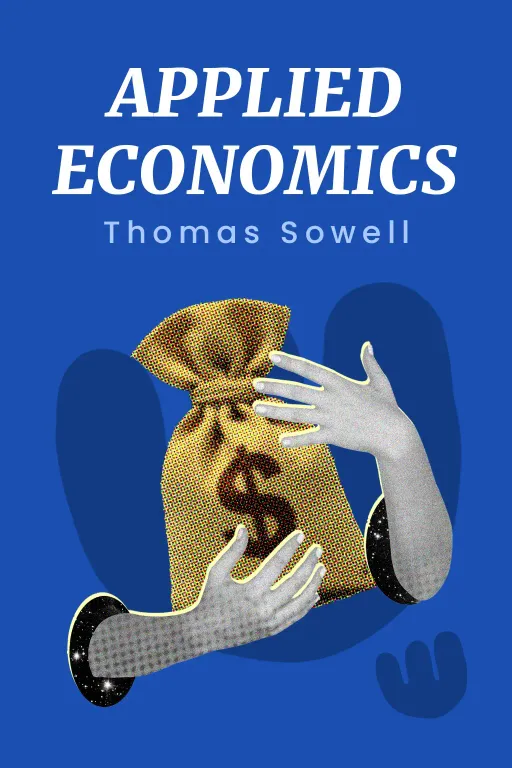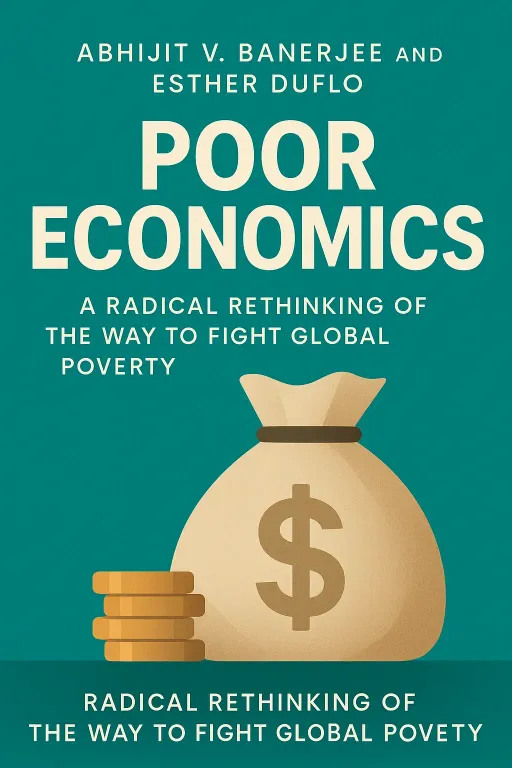
The Ripple Effect: Seeing the World Beyond Stage One
11 minGolden Hook & Introduction
SECTION
Nova: Imagine waking up one morning and the government has ordered all prices to be slashed in half. Sounds amazing, right? A dream come true. But what happens next? What happens when the shelves go bare, the bread disappears, and the economy grinds to a halt? This isn't a hypothetical; it's what Thomas Sowell calls the 'Stage One' trap in action.
估计: It's an incredibly seductive idea, that you can just command a better reality into existence. But reality, as we know, is rarely that simple.
Nova: Exactly. And that's the core of what we're exploring today, inspired by Thomas Sowell's brilliant book, 'Applied Economics: Thinking Beyond Stage One.' We are so thrilled to have 估计 with us, a deeply curious and analytical thinker who is passionate about innovation and is currently deep in study for exams. Welcome, 估计.
估计: Thank you for having me, Nova. This book feels less like an economics text and more like a manual for critical thinking, which is perfect for anyone trying to learn, well, anything.
Nova: I couldn't agree more. It's a mental toolkit. And today, we're going to unpack two of its most powerful tools. First, we'll explore that 'Stage One' trap, looking at why political logic so often clashes with economic reality. Then, we'll tackle the 'Paradox of Help,' examining how well-meaning policies can have devastating, unintended consequences. It's all about learning to see the ripples, not just the splash.
Deep Dive into Core Topic 1: The 'Stage One' Trap
SECTION
Nova: So let's start with that first idea: The 'Stage One' Trap. It's this huge, fundamental conflict between what feels good politically and what actually works economically. And there's no better, or more dramatic, example than what happened in the United States in 1971 under President Richard Nixon.
估计: I'm familiar with the era, but probably not the economic details. What was the situation?
Nova: The situation was inflation. Prices were rising, people were anxious, and there was immense political pressure on the White House to "do something." So, Nixon's administration came up with a 'Stage One' solution that seemed incredibly simple and direct: they would impose the first-ever peacetime wage and price controls in the country's history. They would literally make it illegal for businesses to raise prices or for employers to raise wages.
估计: On the surface, that sounds like a direct solution to the problem. If prices are rising, just... stop them.
Nova: Precisely. That's the 'Stage One' thinking. It was immensely popular. The media praised Nixon's bold leadership. Now, his own economists, including his advisor Herbert Stein, knew this was a terrible idea. They understood the economics. But Nixon's response, famously, was, "I don’t give a good goddamn what Milton Friedman says. He’s not running for re-election."
估计: Wow. That one sentence says everything, doesn't it? The goal wasn't economic stability; the goal was the next election.
Nova: It was! And it worked beautifully... in Stage One. Nixon won a landslide re-election in 1972. A massive political victory. But then, the ripples started. Stage Two began to arrive. With prices frozen, what incentive does a farmer have to sell their products?
估计: Very little. If the cost to raise a chicken is more than the price you're legally allowed to sell it for, you stop raising chickens.
Nova: You are exactly right. And that's what happened. Farmers began drowning their chickens. Cattle ranchers withheld their herds from the market. Suddenly, food store shelves started to empty. The policy, designed to make things affordable, was now making them unavailable. And it got worse. The controls extended to gasoline, and that's when the country was hit with the infamous gas shortages of the 1970s. People waited in lines for hours, sometimes for days, just to fill their tanks. The policy created the very scarcity and chaos it was meant to solve.
估计: It's a powerful story. So, you have this leader who knows the economics are bad, but the political incentive is just too strong. As an analytical thinker, what does that tell you about the systems we operate in?
Nova: That's the million-dollar question, isn't it?
估计: It seems like a fundamental design flaw in the system. The feedback loop for a politician is the next election, which is a very short cycle. But the feedback loop for the economy is much longer and more complex. It's like, in the tech world, optimizing a product for a single 'click' instead of for long-term 'customer value.' You can get the click, but you might lose the customer forever.
Nova: That's a fantastic analogy.
估计: And in the world of innovation, we face a similar pressure. The demand from investors or executives for a quick, flashy demo can sometimes kill a project that needs longer, quieter development to be truly revolutionary. You're forced to perform for Stage One, even if it compromises Stage Two.
Nova: The flashy demo! Sowell's point is that voters and the media often fall for that demo, because thinking about Stage Two is hard work. It requires you to look past the appealing promise and ask about the hidden mechanics, the incentives, and the constraints. It's a discipline.
Deep Dive into Core Topic 2: The Paradox of Help
SECTION
Nova: And that idea of short-term thinking and ignoring incentives leads us right into our second, and perhaps even more counterintuitive, topic: The Paradox of Help. This is where the stated goal is to protect a vulnerable group, but the unseen 'Stage Two' consequences end up doing the opposite.
估计: This feels even more complex, because the intentions are often so noble. It's not just about political calculation.
Nova: Exactly. The intentions are pure, which makes the outcome even more tragic. Let's take the Americans with Disabilities Act, or ADA, passed in 1992. The goal was crystal clear and morally sound: to prevent discrimination against people with disabilities and to mandate that employers make "reasonable accommodation" for them. Who could argue with that?
估计: No one. It sounds like a basic measure of a decent society.
Nova: It does. That's Stage One: a just law is passed, and we feel we've made society better. But Sowell, in his book, points to economic research that looked at what happened after the law was passed. And what these two economists found was startling. In the wake of the ADA, the employment of people with disabilities actually declined.
估计: Declined? How is that possible? The law was designed to do the exact opposite.
Nova: This is the heart of the paradox. The researchers suggested a possible Stage Two explanation. The law's language, particularly "reasonable accommodation," is inherently vague. What's 'reasonable' to one person might be a huge expense to a small business owner. This, combined with the new potential for costly and time-consuming lawsuits, might have changed the calculation for employers.
估计: So, it's not that employers suddenly became more prejudiced. It's that the law, unintentionally, made hiring a person with a disability seem like a bigger financial and legal risk.
Nova: That's the argument. The incentive structure shifted. An employer looking at two equally qualified candidates might, consciously or subconsciously, shy away from the one who represents a more unpredictable future cost. The desire to help, codified in law, may have created a new barrier to entry.
估计: This one is so tough. The intention is pure, but the result, according to this research, is the opposite. How do we even begin to solve problems like this if our best-intentioned solutions can make things worse?
Nova: It's a profound challenge. What do you think, 估计? How does this resonate with your own studies and your interest in systems?
估计: It forces us to ask a better question. Instead of starting with 'What is our goal?', which is what the ADA did, Sowell's thinking forces us to start with, 'What behavior does this rule incentivize?' It’s a critical shift from focusing on intentions to focusing on incentives.
Nova: I love that framing. Intentions versus incentives.
估计: It reminds me of studying for an exam. My stated goal is to learn the material deeply. But if I know the exam will only test my ability to recall specific, isolated facts, the system is incentivizing me to cram and memorize, not to build a real, lasting understanding. The design of the test is creating a bad outcome—superficial knowledge—despite my good intentions. The ADA example feels like that, but on a massive, societal scale.
Nova: That is a perfect, and perfectly relatable, analogy. The system's design is creating perverse incentives. And it highlights the danger of what Sowell calls 'one-stage thinking.' We celebrate the passage of the law, the 'A' on the test, without examining the real learning or the real employment that happens in Stage Two.
Synthesis & Takeaways
SECTION
Nova: So, as we wrap up, we've really looked at two incredibly powerful, and challenging, ideas from 'Applied Economics.' First, we saw the 'Stage One' trap, where the short-term logic of politics can lead to long-term economic pain, like with Nixon's price controls.
估计: And second, we explored the 'Paradox of Help,' where our noblest intentions can backfire if we don't rigorously examine the incentives we're creating, as the ADA example suggests.
Nova: And the common thread, the big takeaway for me, is that this isn't about being a Democrat or a Republican, or being for or against government. It's about adopting a new mental discipline.
估计: I agree. It's the discipline of looking past the immediate and the obvious. It's not about being cynical or pessimistic. It's about being a more rigorous and effective thinker. It’s about seeing the whole chessboard, not just the next move.
Nova: That's the perfect summary. Seeing the whole chessboard. So, for everyone listening, and for you, 估计, as you continue your studies and pursue your interest in innovation, here's the challenge. The next time you hear a proposal, whether it's from a politician, in a news report, or even in a textbook, don't just ask, "What is this supposed to do?" Ask the question that Sowell's professor at Harvard, Arthur Smithies, asked him all those years ago...
估计: ...'And then what will happen?'
Nova: Exactly. 'And then what will happen?' It's such a simple question, but it can change everything. It's the key to unlocking Stage Two. 估计, thank you so much for helping us see the ripples today.
估计: It was a true pleasure, Nova. It's given me a lot to think about, and a new question to ask in my studies.









